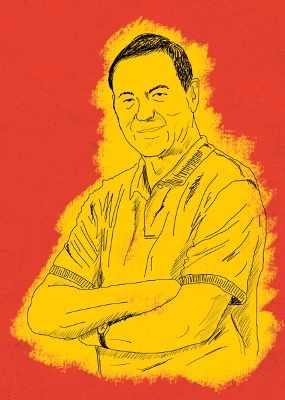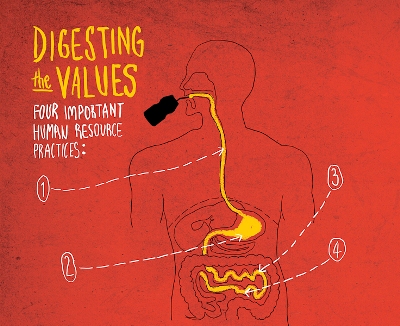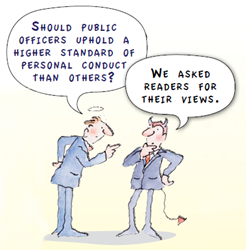Growing the Right Culture

In 1996, the Canadian government set up a programme to raise awareness of industries in Quebec province. It seemed to run well, until widespread corruption was discovered in 2004. Investigators found serious fraud, including funds channelled back to the ruling Liberal Party, and millions paid for work never done. The scandal cost the Liberals the 2006 election.
Subsequently, the Canadian government decided to focus on strengthening public service values to prevent another slip-up. An independent office was set up for faster reporting of wrongdoing, and for annual reports on integrity in the public service.
The Canadian experience shows the need to build a strong culture of public service values. Because when values are thrown into question, public distrust festers. When a government strengthens its values, public confidence can be restored and grow stronger.
Singapore’s Public Service has not been infallible. In recent months, the question of values has emerged more strongly than ever, with convictions of public officers for cheating and other investigations for alleged misconduct.
Head of Civil Service Peter Ong said in March 2012 that “episodes like these undermine our reputation as a Public Service that’s clean and incorrupt. It makes some wonder if the Public Service and the values we espouse are being eroded. There are officers who’ve felt let down by these episodes. I share the same disappointment.”
The only way to preserve trust and ensure that individual failings do not lead to systemic weaknesses, he said, is to take firm, decisive action against those in the wrong.
He reiterated that his “faith in the integrity of public officers and the Public Service has not wavered”, noting that most officers continue to earn public trust.
The Singapore Public Service values
The Singapore Public Service’s current set of core values – Integrity, Service and Excellence – was developed in 2003 to strengthen Public Service identity and reflect shared ethos. Despite the recent incidents, Mr Ong says the current Public Service values are still “relevant today”.
But he admits that the “communication of the values, what they mean, and how they should guide our everyday decisions and behaviours can be improved”. Not in a top-down approach but through increased conversations between Public Service leaders and their teams.
“So there’s a better understanding of how changing operating environments could have implications on how the values are lived out,” he explained.
Formally, the Civil Service College (CSC) – the Public Service training arm – has a systematic curriculum to cover values and ethos in the induction programme for every new officer. CSC Dean Lionel Yeo said that trainers use case studies and scenario cards to trigger discussions about desirable mindsets and behaviour. “Fireside chats” with public sector leaders let officers – incumbent and new – engage them directly on issues.
When Challenge asked some officers to recall the Public Service values, there was an even mix of those who could and those who couldn’t (see below).
An officer said: “I don’t recall anyone specifically highlighting these values to me at any point of my 14-year career in the Public Service. Yet she felt that many are already living out the values. “[Officers] may not know them collectively as ‘the Public Service values’, but I’m almost certain these values have become second nature to many.”
Attitudes towards VALUES
Challenge spoke to some public officers:
An officer said she knew the importance of values but “I’m swamped by daily work to even integrate and care about the values and culture.”
Dr Marieta Chan of the Health Sciences Authority (HSA) thinks that more frequent “reminders” of the values would be good “especially when we’re over worked or stressed out from work as they can give me a ‘ boost’ to remind me that my work helps the public”.
A Media Development Authority (MDA) officer said: “Our core values are integrated into our appraisal form. They’re hard to miss and now totally ingrained in staff psyche!”
Another officer who only recalled his agency’s values suggested posting the Public Service’s values more prominently on agencies' Intranets.
Another officer said that while it may not seem “very cool” to be regularly reminded of the vision and mission, “it bears repeating and reminding people why they chose to be in the Public Service in the first place.” She added that her Permanent Secretary has a knack of making speeches that inspire staff and remind them of the Public Service values without coming across as preachy.
The importance of culture and values
Values, according to Michael Henderson and Dougal Thompson from consulting firm Values At Work, are “‘ideas’ of what gives a sense of meaning or worth”. Values are then applied within an organisational culture. John Purcell from the Chartered Institute of Personnel and Development (CIPD) in Europe said that “organisational culture is a system of shared values and beliefs about what is important, what behaviours are appropriate and about feelings and relationships internally and externally.”
The importance of values and culture are increasingly being recognised. Singapore’s Public Service values, for instance, have contributed to the country’s success. Brand Finance picked it as one of the world’s 10 fastest-growing nation-brands, and said the ranking reflects Singapore’s clean government, efficient infrastructure, low corruption, hospitable business environment, well-educated English-speaking workforce and pro-business values. Transparency International ranked Singapore on par with Denmark and New Zealand for the world’s highest transparency and accountability.
Values and culture are prized in the private sector too. Much research has shown how strong corporate culture and values make a big difference to organisations.
Business guru Jim Collins wrote in his book Built to Last that culture is a key determinant of sustained superior performance for successful companies. Mr Collins said that “architects of visionary companies don’t just trust in good intentions or ‘values statements’; they build cult-like cultures around their core ideologies.”
Former World Bank Values Coordinator Richard Barrett said that “creating a corporate culture that aligns with the values of all stakeholders, employees, customers, shareholders and society is the critical issue for business in the 21st century.”
Professor David Giacalone of Temple University told Challenge that “both consumers and potential employees want to be associated with organisations with the right values.” This means strong values help organisations attract the right talent, and also boost bottomlines.
One of the best-known examples of a successful culture built around core values is technology giant Hewlett-Packard (HP). Founders William Hewlett and David Packard builtthe company around the values of technological contribution, superior performance, hiring the right staff, contributing to the community, and integrity that became known as ‘The HP Way’.
For decades HP followed ‘The HP Way’, using everything from stories and rituals to rewards to reinforce values, to become a high-tech success. When HP veered off-course and made “a series of decisions incompatible with the fundamental precepts that made the company great”, as Collins described it, the company started downhill towards mediocre results.
How Leading Companies do it
SAS Institute
Leadership training consultant Michael Stallard writes on his website that SAS co-founder Dr Jim Goodnight (above) has long believed that “work environments affect employee productivity and retention”, and that “the work culture is key to the creativity inherent in knowledge work”. From the get-go, he treated SAS employees as he wanted to be treated. In return, he expected they would be more likely to stay, align their behaviour with organisational goals, and give their best. Staff perks include a health club, subsidised cafeteria and child care facility onsite. SAS has no dress code, no set work hours nor any limit on sick days. There is a culture of informality and openness, and Dr Goodnight holds “Java with Jim” sessions for employees to have coffee with him and ask any question. Mr Stallard observed that “the culture works because it meets human needs that are necessary to thrive at work: respect, recognition, belonging, autonomy, personal growth and meaning. When these needs are met, people thrive, individually and collectively”.
Singapore Prison Service (SPS)
Up till the late 1990s, SPS focused on secure custody of offenders. After Mr Chua Chin Kiat (above) became head of SPS in 1998 after a long career in the police force, he visited many prisons and
“realised how little we did for the inmates”. As he told the Wall Street Journal, he knew “we needed to change”. After studying prisons overseas and analysing academic research, Chua came
up with an entirely new approach. Prison officers would become “captains in the lives of offenders committed to our custody”. This required officers to get to know the prisoners and make a difference in their lives, something which upended past practices and made some officers uncomfortable. But recidivism dropped 50 per cent between 1995 and 2005, and SPS has been named Singapore’s top employers twice.
Nurturing a values-based organisational culture
Research has begun to indicate the fundamental steps organisations have to take to strengthen values. Having the right human resource (HR) practices is critical. Prof Giacalone listed four important ones.
Digesting the Values
Four Important Resource Practices:
- For staff to imbibe the right values, leaders must openly model the values at the work place.
- Having effective recruitment and selection practices help bring in individuals whose values are aligned with their employers.
- Training and development help to embed values within the organisation.
- Close the “loop” by clearly and effectively rewarding individuals whose behaviour integrates the values.
Consulting firm Accenture says values can be “brought to life” through rituals, lessons, images and stories that top management uses to show how values translate into action. Over time, these strategic messages become shared mindsets permeating the organisation.
Online retailer Zappos.com’s CEO Tony Hsieh wrote in online media Huffington Post that “if you get the culture right, then most of the other stuff, like delivering great customer service or building a long-term enduring brand or passionate employees and customers will happen naturally on its own.”
Culture, he wrote, starts with the hiring process, so all recruits go through two rounds of interviews; the first to assess technical skills, the second for “culture fit”. Zappos.com has rejected highly competent people who did not “fit” into its culture. After hiring, everyone undergoes four weeks’ training on company history, vision and philosophy, as well as customer service training (regardless of their designations) as this is the core of Zappos.com. Commitment to core values, added Mr Hsieh, is being “willing to hire and fire based on them”.
Leaders have to exemplify values
To put the concepts outlined by Prof Giacalone into practice in the Public Service, there are three critical steps. The first is for leaders to acknowledge their role. Deborah Rhode and Amanda Packel wrote in the Stanford Social Innovation Review that “often, the most critical determinant of workplace culture is ethical leadership. Employees take cues about appropriate behaviour from those at the top. No organisational mission statement or ceremonial platitudes can counter the impact of seeing leaders withhold crucial information, play favourites, stifle dissent, or pursue self-interest at the organisation’s expense”.
But the burden doesn’t rest only on top honchos. Mr Ong told Challenge that those in supervisory roles must lead by “living” the Public Service values daily. Even middle managers can help cascade values down, for a sense of ownership.

Economic Development Board Chairman Leo Yip advocates living out values in daily decision-making. “It’s one thing to talk about [values] but another to be doing it every day. Very few decisions are straightforward. When you make that decision, [you first] weigh different factors to trade off. If there’s a trade-off between integrity and something else, and if integrity doesn’t win the day, then your value isn’t meaningful.”
He said this has an impact on staff as they can see clearly if their leader’s decisions are aligned with the organisation’s values.
Create rituals, tell stories
The second step is to tell stories, creating rituals and images that reinforce Public Service values. Leaders who hear heartwarming stories about officers who exemplify the values can talk about them over lunch or at sessions like “Java with Jim”.
Mr Ong did just this at the recent Administrative Service Dinner when he spoke about NParks officer Yang Shufen’s dedication to excellence, how she “sometimes has to go out to Pulau Tekong on a boat in the wee hours of the morning”, and how “getting knee-deep in mud and fighting swarms of mangrove insects are just part and parcel of her job”.
Carrots and sticks
The third step is to reward exemplary staff or take quick corrective action when behaviours are not aligned with values.
Mr Yip told Challenge that in committing to values at organisations that he has led, he’s had to make tough calls. “I have asked people to leave, where there are clear actions that are visible to staff – not only when there was misconduct, but also when their behaviour didn’t reflect our values.”
While the Public Service gives annual service awards to officers who go the extra mile, social worker Ben Teo (who won the 2009 PS21 Star Service Award) thinks exemplary officers and best practices should be given more “air-time”. “We need to toot our horns once in a while. The Police have Crime Watch to boost public confidence and education, so could we raise the profile of Public Service via a TV show to share heartwarming stories and challenges?”
Chipping in to make it work
Making values like Integrity, Service and Excellence “come alive” will always be a challenge, especially when staff struggle with daily work pressures. It is also why they can be easily taken for granted. Yet, experience shows how embedding values in staff and turning them into reality can create superior performance.
It also means officers of every level must also take tangible action to put Public Service values into practice at work and in the community.
Whether it’s telling a story to a colleague, stopping to help a person in need, rewarding staff who demonstrate superior service or other daily practices, taking values to heart and spreading them can make the difference that actually creates leading-edge results.
With additional reporting by Bridgette See.
- POSTED ON
May 25, 2012
- TEXT BY
Richard Hartung
-
Deep Dive
Strengthening Singapore’s Food Security
-
Feature
Why DBS Wants To Be Gandalf












